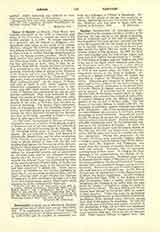

Caesar of Speyer (or SPIRES), Friar Minor, first minister provincial of the order in Germany, and leader of the Caesarines, b. towards the close of the twelfth century; d. in 1239. He became renowned as a preacher, and the number of Albigenses who abandoned their errors as the result of his zealous efforts so enraged the heretics against him that he was obliged to leave his native city. In 1212 he went to Paris, where he studied theology under Conrad of Speyer, the famous crusade-preacher. While in the Holy Land in 1217, Csar of Speyer was received into the Franciscan Order by Brother Elias of Cortona, the first provincial of Syria; early in 1221 he returned to Italy with St. Francis and Peter of Catania. It is interesting to note that the Rule of 1223 was probably written by Csar of Speyer at the dictation of St. Francis, and it is very likely that St. Francis refers to him in the words of his “Testament”: “et ego paucis verbis et simplicibus feci scribi et Dominus Papa confirmavit mihi.” At the chapter of Pentecost held at Assisi in 1221, Caesar, together with twenty-five companions, was chosen to go to Germany, and after three months’ preparation in the valley of Spoleto, the missionaries set out on their journey northward. They were welcomed by both clergy and people at Trent, Brixen, and other cities, and in October of the same year the first provincial chapter of the order in Germany was convoked by Caesar at Strasburg. The famous Tatar missionary, John of Piancarpino, and the chronicler, Jordan of Giano, were both present at this chapter; on its conclusion the friars dispersed throughout the different provinces of Germany, according to Caesar’s instructions, to meet again the following year.
In 1223 Caesar, accompanied by Thomas of Celano, returned to Assisi to be present at the general chapter of Pentecost, and at his own request was relieved of the office of provincial minister by St. Francis. Of the remaining fifteen years of Caesar’s life little is known. He was probably in Italy, with Bernard of Quintavalle, Blessed Giles, and the other companions of St. Francis, encouraging the friars by word and work to remain faithful to their rule and life, and warning them against the innovations of the Relaxati. Jordan of Giano says of Caesar of Speyer at this time: “He was a man wholly given to contemplation, most zealous for evangelical poverty and so commended by the other friars that he was esteemed the most saintly after St. Francis.” Owing to his opposition towards the Relaxati Caesar was imprisoned by order of the minister general, Brother Elias; he finally met a violent death at the hands of the lay brother who had been appointed to guard him. There seems, however, no warrant for the opinion expressed by some that he was murdered by order of Elias, and the slight coloring which Angelo Clareno and Ubertino of Casale give to their accounts of his tragic end is due to the bias and bitterness against Elias‘s party which characterize all the writings of the Spirituals.
STEPHEN M. DONOVAN

